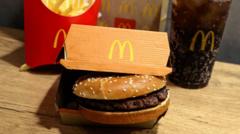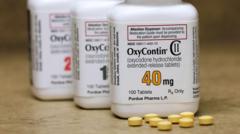After a temporary halt on sales due to an E. coli outbreak, McDonald's has officially resumed offering its Quarter Pounder burgers in US locations, following negative test results for the implicated beef patties.
McDonald's Resumes Quarter Pounder Sales Following E. coli Scare

McDonald's Resumes Quarter Pounder Sales Following E. coli Scare
Fast food giant McDonald's confidently returns Quarter Pounder burgers to menus as testing reveals no E. coli contamination.
Following an E. coli outbreak that tragically affected dozens and resulted in at least one fatality, McDonald's has announced the return of its Quarter Pounder burgers across all US restaurants. The company's decision follows thorough testing conducted by the Colorado Department of Agriculture (CDA), which confirmed that their beef patties tested negative for the harmful bacteria. The CDA reported that they will cease any further testing related to this incident.
Sales of the Quarter Pounder were suspended last week at approximately 20% of McDonald's locations, as the company worked to identify the source of the contamination. "The issue appears to be contained to a specific ingredient and geographic area, and we remain very confident that any contaminated product related to this outbreak has been removed from our supply chain," stated Cesar Piña, McDonald's North America Chief Supply Chain Officer.
Additionally, attention shifted to slivered onions as another potential culprit after the US Food and Drug Administration (FDA) issued warnings. Consequently, McDonald's has ceased its partnership with the supplier, Taylor Farms of Colorado Springs, and has taken measures to eliminate slivered onions from their offerings. As a result, 900 locations that previously used these onions will now offer the Quarter Pounder without this ingredient.
Despite these remedial actions, McDonald's is grappling with lawsuits from affected customers. The US Centers for Disease Control and Prevention (CDC) has advised anyone experiencing symptoms such as diarrhea, fever, or vomiting after consuming the Quarter Pounder to consult with a healthcare professional. Symptoms can manifest up to four days post-consumption, and while most recover within days, some cases could necessitate hospitalization.
Moreover, McDonald's shares have declined over 7.5% since the CDC's announcement of the outbreak, coinciding with a notable dip in global sales reported in July—the first in over three years. As the fast food industry adapts to increasing consumer price sensitivity, chains like McDonald's and Burger King are reevaluating their value meal offerings to attract lower-income customers feeling the strain of rising costs.
Sales of the Quarter Pounder were suspended last week at approximately 20% of McDonald's locations, as the company worked to identify the source of the contamination. "The issue appears to be contained to a specific ingredient and geographic area, and we remain very confident that any contaminated product related to this outbreak has been removed from our supply chain," stated Cesar Piña, McDonald's North America Chief Supply Chain Officer.
Additionally, attention shifted to slivered onions as another potential culprit after the US Food and Drug Administration (FDA) issued warnings. Consequently, McDonald's has ceased its partnership with the supplier, Taylor Farms of Colorado Springs, and has taken measures to eliminate slivered onions from their offerings. As a result, 900 locations that previously used these onions will now offer the Quarter Pounder without this ingredient.
Despite these remedial actions, McDonald's is grappling with lawsuits from affected customers. The US Centers for Disease Control and Prevention (CDC) has advised anyone experiencing symptoms such as diarrhea, fever, or vomiting after consuming the Quarter Pounder to consult with a healthcare professional. Symptoms can manifest up to four days post-consumption, and while most recover within days, some cases could necessitate hospitalization.
Moreover, McDonald's shares have declined over 7.5% since the CDC's announcement of the outbreak, coinciding with a notable dip in global sales reported in July—the first in over three years. As the fast food industry adapts to increasing consumer price sensitivity, chains like McDonald's and Burger King are reevaluating their value meal offerings to attract lower-income customers feeling the strain of rising costs.


















